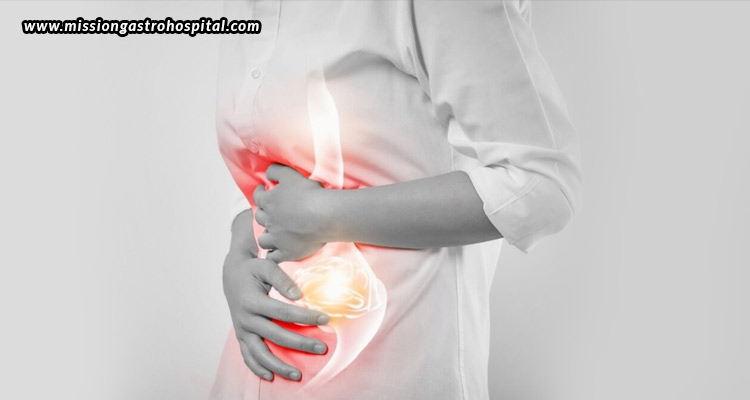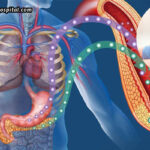Digestive disorders frequently manifest through mild symptoms that individuals may overlook as insignificant discomforts. Nevertheless, these initial indicators may signal more severe issues, including gastroesophageal reflux disease (GERD), irritable bowel syndrome (IBS), fatty liver disease, and potentially colorectal cancer. Identifying these subtle signs at an early stage can facilitate prompt diagnosis and treatment, thereby averting complications. This detailed guide will examine the early symptoms associated with these conditions and emphasize the importance of not disregarding them.
Gastroesophageal Reflux Disease (GERD)
Gastroesophageal reflux disease (GERD) arises when stomach acid frequently backs up into the oesophagus, causing irritation to its lining. While many individuals confuse it with occasional acid reflux, chronic GERD can result in serious complications, such as oesophageal ulcers and Barrett’s oesophagus, which is a precancerous condition.
Silent signs of GERD
- Persistent Heartburn: A burning sensation in the chest that is often misinterpreted as acidity or heart-related issues.
- Chronic Cough: Irritation from acid in the throat may lead to a persistent cough without an obvious cause.
- Sore Throat and Hoarseness: Inflammation caused by GERD can result in a raspy voice.
- Difficulty Swallowing (Dysphagia): The feeling of food being lodged in the throat may suggest damage to the oesophagus.
- Regurgitation of Food or Sour Liquid: A bitter taste in the mouth or the sensation of food returning to the throat.
- Bad Breath (Halitosis): Acid reflux can promote bacterial growth, resulting in ongoing bad breath.
When to see a doctor?
If you experience heartburn more than twice weekly, have trouble swallowing, or suffer from an unexplained cough, it is advisable to see a gastroenterologist to avert complications such as oesophageal strictures or cancer.
Irritable Bowel Syndrome (IBS)
Irritable Bowel Syndrome (IBS) is a prevalent functional disorder that impacts the large intestine. Although it is not life-threatening, it can greatly diminish one’s quality of life. Symptoms are frequently dismissed or mistaken for minor digestive problems.
Silent signs of IBS
- Frequent Bloating: Experiencing an uncomfortable sense of fullness or gas even after consuming small portions.
- Changes in Bowel Habits: Alternating episodes of diarrhoea and constipation without an obvious explanation.
- Abdominal Cramping: Discomfort or pain that varies in severity.
- Mucus in Stool: An indication of irritation within the digestive system.
- Relief After Bowel Movements: Symptoms typically lessen following a bowel movement.
When to see a doctor?
If your symptoms persist for over three months, cause considerable discomfort, or interfere with your daily life, it is advisable to seek medical advice to exclude other conditions such as inflammatory bowel disease (IBD) or celiac disease.
Fatty Liver Disease
Non-alcoholic fatty liver disease (NAFLD) is a condition that is becoming increasingly prevalent due to the accumulation of fat in the liver. In its initial stages, it often presents no symptoms; however, if not addressed, it may progress to liver inflammation (steatohepatitis), cirrhosis, and ultimately liver failure.
Silent signs of NAFLD
- Unexplained Fatigue: A persistent sense of tiredness that does not improve with rest.
- Mild Discomfort in the Upper Right Abdomen: A dull pain or sensation of heaviness in the liver area.
- Unexplained Weight Loss: In advanced stages, the liver’s ability to function effectively diminishes.
- Dark Urine and Light-Coloured Stool: These changes can signal compromised liver function.
- Jaundice: Yellowing of the skin, indicative of significant liver damage.
When to see a doctor?
If you possess risk factors such as obesity, diabetes, or high alcohol intake, it is advisable to undergo regular liver function assessments. Early identification of the condition can help avert the progression to cirrhosis or liver cancer.
Colorectal cancer
Colorectal cancer frequently progresses without any obvious symptoms in its initial stages, which underscores the importance of regular screenings. When symptoms do manifest, they are often overlooked as trivial digestive problems.
Silent signs of colorectal cancer
- Alterations in Bowel Patterns: Ongoing diarrhoea, constipation, or stools that are narrower than usual.
- Presence of Blood in Stool (Even in Small Quantities): May be bright red or dark and tarry.
- Unexplained Weight Loss: A significant indicator of a potential health issue.
- Abdominal Discomfort or Cramping: Commonly misinterpreted as gas or indigestion.
- Sensation of Incomplete Bowel Evacuation: Even after a bowel movement.
- Iron-Deficiency Anaemia: Symptoms include fatigue and pallor due to gradual internal bleeding.
When to see a doctor?
Individuals over the age of 45 or those with a family history of colorectal cancer should arrange for regular colonoscopy screenings. Early identification significantly enhances survival rates.
Other digestive symptoms that shouldn’t be ignored
- Chronic nausea or vomiting: Ongoing nausea may suggest conditions such as gastritis, gallbladder disease, or pancreatic disorders.
- Frequent burping or gas: An increase in gas may indicate lactose intolerance, bacterial overgrowth, or a more serious digestive issue.
- Unexplained food intolerances: The sudden onset of discomfort from specific foods may point to celiac disease or food allergies.
- Skin problems: There is a connection between poor gut health and inflammatory skin conditions, indicating a potential digestive imbalance.
The digestive system plays a crucial role in overall health. While some digestive symptoms may appear trivial, they can signify serious underlying issues such as GERD, IBS, fatty liver disease, or colorectal cancer. It is essential to recognize even the most subtle warning signs and seek prompt medical attention to prevent complications and enhance long-term health. If you are facing ongoing digestive issues, it is advisable to consult a gastroenterologist for accurate diagnosis and treatment. After all, your gut health is absolutely vital; so do not overlook the symptoms! Mission Gastro Hospital, the best gastro hospital in Ahmedabad, offers expert diagnosis and advanced treatment for GERD, IBS, fatty liver disease, and colorectal cancer. Trust the experienced specialists here for comprehensive digestive care.








